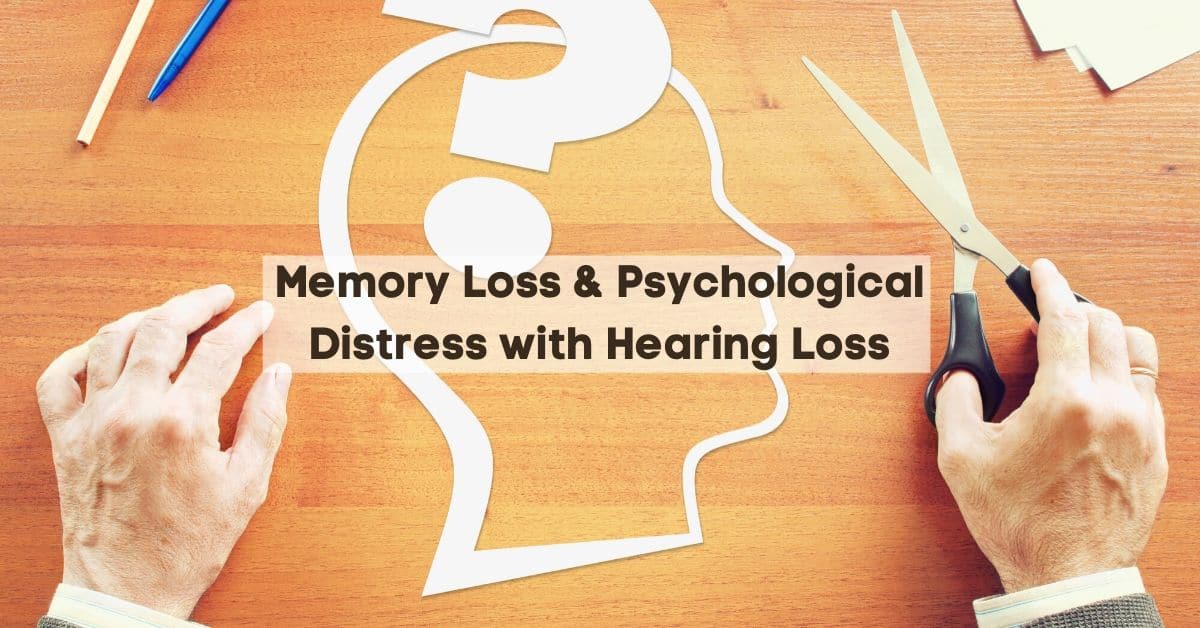Hearing loss is an increasingly common medical condition that millions of people experience. Caused by a variety of factors including existing medical conditions, genetic history, and exposure to loud noise; hearing loss can profoundly impact all aspects of a person’s life. It has been linked to numerous health concerns including cardiovascular disease, dementia, and accidental injury. Growing research also shows a relationship between hearing loss and memory loss as well as psychological distress.
Memory Loss & Psychological Distress
One of the most significant studies linking memory loss, psychological distress, and hearing loss was conducted in 2016 at the University of Tsukuba in Japan. In this study, researchers analyzed data collected by a large scale survey of living conditions in Japan. Specifically examining information collected from 137,723 people, age 65 or older without dementia; 9% reported having hearing loss. For the population with hearing loss – compared to the population without hearing loss – findings include:
- 39.7% experience psychological distress vs. 19.3%
- 37.7% experience memory loss vs. 5.2%
These significant numbers reveal the strong correlation between hearing loss, memory loss, and psychological distress. To understand this relationship, it’s helpful to be aware of the impact of hearing loss.
Impact of Hearing Loss
A reduced ability to hear has significant, and far reaching effects. Impaired hearing strains communication which is a major way we navigate (and understand) the world. Communication is critical for maintaining healthy relationships, managing professional responsibilities, and participating in our favorite activities. Hearing loss strains communication in numerous ways including:
- Causing tinnitus which is a ringing or buzzing noise in one or both ears
- Muffling sound, making it difficult to distinguish words
- Requiring people to move to quieter areas to engage in conversation
- Frequently needing others to repeat themselves, speak loudly and/or slowly
These symptoms make it incredibly difficult to follow entire conversations, speaking with multiple people simultaneously, multitask et. People may find themselves reading mouths in trying to identify words, thinking about how to respond, and missing parts of the conversation. This makes engaging with others tiresome and feels like more work rather than pleasure. Being drained by communicating, this can lead to:
- Social withdrawal: because conversations can be exhausting and unpleasant, people may avoid social gatherings, environments with background noise, events etc. This results in spending less time with family and friends, missing out on milestone moments, and experiencing and sharing joy with others.
- Strained relationships: isolating oneself creates distance and tension in relationships. Not spending quality time with the people in your life in addition to ineffective communication can cause relationships to suffer.
- Psychological Distress: the culmination of strained communication, social withdrawal, and distant relationships can take a drastic toll on one’s mental, physical, and emotional health. It can contribute to feelings of loneliness, depression, anxiety, and stress which hinders general well-being.
If hearing loss remains untreated, it can worsen and contribute to the development of other health issues.
Treating Hearing Loss
Addressing hearing loss as soon as possible is critical. Treatment can protect hearing health, improve cognitive function, and overall health. Treating hearing loss is relatively simple and painless! It involves the following:
- Scheduling appointment: the first step is to schedule an appointment with a hearing healthcare specialist to have your hearing evaluated. Hearing tests are noninvasive and straightforward. Essentially, you are guided through sounds played at various frequencies and volumes, and you respond to what you hear. This measures your hearing ability in both ears and determines the degree of hearing loss, if any. Your results are shared with you during this appointment and your treatment options are also discussed.
- Hearing aids: the most common treatment for hearing loss is hearing aids. These are small electronic devices that are designed to absorb, amplify, and process sound. This significantly increases one’s ability to hear in all types of environments. Like most electronics, hearing aids have experienced much innovation over the years and are not the bulky devices you may be thinking of! There are a wide range of options with varying technologies that create optimal listening experiences for the user.
Treating hearing loss strengthens communication, improves cognitive function, and improves relationships. This enhances longevity and quality of life! Contact us today to schedule an appointment for a hearing test and consultation.

